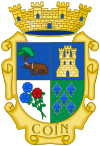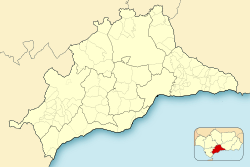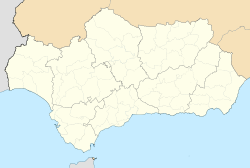Coín facts for kids
Quick facts for kids
Coín
|
|||
|---|---|---|---|
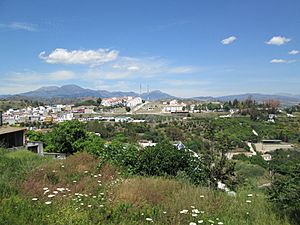 |
|||
|
|||
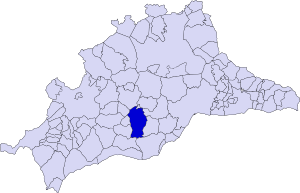
Location of the municipality of Coín
|
|||
| Sovereign state | |||
| Autonomous community | |||
| Province | |||
| Comarca | Valle del Guadalhorce | ||
| Area | |||
| • Total | 127.37 km2 (49.18 sq mi) | ||
| Elevation | 202 m (663 ft) | ||
| Population
(2018)
|
|||
| • Total | 21,716 | ||
| • Density | 170.495/km2 (441.581/sq mi) | ||
Coín is a lovely town and municipality in the Province of Málaga, Spain. It is about 33 kilometers (20 miles) west of the main city, Málaga. Coín is also about 30 kilometers (18 miles) north of Marbella. Around 22,000 people live in Coín.
Many people from other countries now live in Coín. They like the town because it is close to the beautiful beaches of Málaga and Marbella. The coastline between these cities is about 50 kilometers long. It includes popular places like Torremolinos, Fuengirola, and Benalmádena.
Contents
Coín's Rich History
Coín has a long and interesting history. The town was once ruled by the Romans. Later, it was controlled by the Moors, who came from North Africa.
Early Rulers: Romans and Moors
The Moors took control of Coín in 929 AD. They ruled the town for many centuries. In 1485, the Christians took back control of Coín. This changed the town's culture and way of life.
The Name of Coín
The old name for Coín was Dacaun. This name came from the Arabic language. Over time, Dacaun changed into "Coín." Some people think the name "Coín" is linked to money, but it is not. It is just how the old name changed over time.
Rebellion and Fortifications
In 929, Coín was part of a big rebellion. This was led by Omar Ben Hafsun against the rulers of Cordoba. To protect Coín, Abderraman III, the first Caliph of Cordoba, made the town's defenses stronger. He built walls and other structures to keep the town safe.
Economy and Local Crafts
For a long time, Coín's economy was based on farming. People also mined marble, which they have done since Roman times. Another important industry was making ceramics.
Traditional Industries
Ceramics became very famous in the 1900s. Coín ceramics have a special color called "Green Coín." The "Cumbreras" workshop was a very important place for ceramics. Today, local artists still make these traditional ceramic items. This craft has been passed down for over 300 years.
Modern Economy
Today, tourism, construction, and hotels are very important for Coín. These new industries have grown a lot. However, there are still many potters in Coín. There are also quarries where marble, dolomite rock, and sand are produced. These materials are used for building.
Coín: A City for Cinema
Coín has also been a place for making movies and TV shows. A special area called Nacimiento was built for this purpose. It was first used to produce a TV series. Later, it also became a place for tourists to visit.
Filming Locations in Coín
For many years, Coín was the setting for several TV series. One of the first was a British show called Eldorado, made by the BBC. After that, two Spanish TV series, "Plaza Alta" and "Arrayan," were filmed here. These shows were made at Loasur studios by Linze TV and shown on Canal Sur.
Images for kids
See also
 In Spanish: Coín para niños
In Spanish: Coín para niños
 | Percy Lavon Julian |
 | Katherine Johnson |
 | George Washington Carver |
 | Annie Easley |



